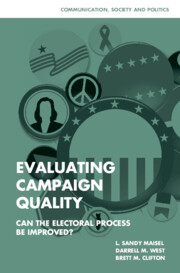Book contents
- Frontmatter
- Contents
- Preface
- 1 Campaign Reformers: Optimists, Skeptics, and Rejectionists
- 2 Dissemination of Campaign Practices
- 3 Impact on Campaign Conduct
- 4 Impact on Campaign Discourse
- 5 Impact on Public Responses
- 6 Improving the System
- Appendices
- A Data and Methodology
- B Public Opinion Survey
- C Consultant Survey
- D Focus Group Protocol
- Notes
- Index
- Titles in the series
A - Data and Methodology
Published online by Cambridge University Press: 03 December 2009
- Frontmatter
- Contents
- Preface
- 1 Campaign Reformers: Optimists, Skeptics, and Rejectionists
- 2 Dissemination of Campaign Practices
- 3 Impact on Campaign Conduct
- 4 Impact on Campaign Discourse
- 5 Impact on Public Responses
- 6 Improving the System
- Appendices
- A Data and Methodology
- B Public Opinion Survey
- C Consultant Survey
- D Focus Group Protocol
- Notes
- Index
- Titles in the series
Summary
This research relied on several different data sources to investigate the quality of campaign discourse in the congressional elections – and the impact of reform efforts on that discourse. In July 2001, we identified House and Senate seats deemed likely to be competitive in November 2002. Our goal was to study competitive districts because these are the districts most likely to see the kinds of problems identified in the past and because competitive races are those most important in determining the overall outcome of an election. We identified the seats drawing on the expertise of three independent analysts who report on congressional elections – Rhodes Cook, editor of the Rhodes Cook Letter; Stuart Rothenberg, editor of the Rothenberg Political Report; and Amy Walter, House of Representatives editor of the Cook Political Report. We also relied on the judgment of experts on our Peer Review Panel and our Advisory Board to confirm our original choice of districts, amending the list according to their suggestions (see Preface).
We contacted scholars who lived or worked in or near the districts and states we had identified to serve as our consultants in these districts. By relying on the academics who knew the local terrain, we brought to bear detailed expertise in these competitive races. Our original list included 20 House seats and 5 Senate seats. We added two additional House seats 2 months into the data-gathering phase of this research because of increased interest in these races.
- Type
- Chapter
- Information
- Evaluating Campaign QualityCan the Electoral Process be Improved?, pp. 117 - 120Publisher: Cambridge University PressPrint publication year: 2007

